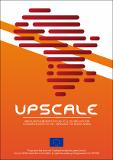| dc.description.abstract | UPSCALE conducted its kick-off conference virtually, coordinatedfrom Maseno University’s (MU) Kisumu Hotel, where a total of 64participants logged in successfully through an online conference link,together with 24 in-person attendants. In addition to the members ofthe UPSCALE Consortium and linked stakeholders, the conferencewas also attended by CEOs of some of the partner organizations (MUand icipe), together with the project’s advisory committee members,EU delegation from Brussels and Kenya, and partners in associatedH2020 projects. Many presentations were made that elucidatedcomposition of the Consortium, objectives, implementationframework, and work packages and their interconnectedness.
UPSCALE comprises transdisciplinary (TD) research that operates atthe national and regional multi-actor community (MACs) of practiceplatforms. MACs are thus a critical feature and structure withinUPSCALE and act as the unifying ‘glue’ that brings together the variouselements of the TD research, sciences and disciplines, partners andtheir ambitions, goals, etc. MACs are designed to provide a platformfor self-reflection and co-learning on the transdisciplinary efforts andto enable optimal flow of information between stakeholders. Becauseof the need for a common understanding of the TD nature ofUPSCALE, a presentation that also served as part one of training wasmade at the conference. Consortium members were also takenthrough the legal and operational requirements and obligations,project management and organizational frameworks covered withinthe Grant and Consortium Agreements, management strategy andfinancial management, reporting and documentation. Notably,eligibility of costs was stressed to be of critical importance, andtherefore the need to ensure compliance. Eligible costs includeddirect personnel costs and direct costs of subcontracting. There wasalso the need to ensure best value for money, verifiability and noconflict of interest. Beneficiaries were urged to keep records andsupporting documentation for 5 years after payment of the balance incompliance with EU audit requirements.
UPSCALE comprises three critical components (i) ‘How to do it’ thatfocusses on elucidating social, ecological and agronomicdeterminants of push-pull success, together with associatedresilience dimensions; functional mapping for mechanistic prediction,mainly chemical remote sensing of crops and host plants, and creationof functional maps for dynamic prediction of insect distribution; socio-ecological and socio-economic impacts of enhancing push-pull acrossscales; and knowledge synthesis for targeted upscaling under achanging climate, modelling resilience under climate change; andimpacts of climate change on sustainable intensification potential. (ii)
H2020-SFS-2019-2
Dx.y Title of deliverable
3
‘Make it work’ that focusses on barriers to adoption and opportunitiesfor improvement across scales, with focus on co-identifying barriersto adoption and strategies to address them; increasing value chainintegration through transdisciplinary exchange; and co-developingpolicy guidelines in collaboration with MACs. (iii) ‘Go beyond’ thatfocuses on co-construction of transdisciplinary push-pull expansionpathways, seeking to co-design pathways for push-pull improvementand expansion; improve existing push-pull systems; expand to othercrops, systems and value chains; explore synergies with othersustainable intensification practices; and assess socio-economicimpact of push-pull innovations. (iv) ‘Make it happen’ that aims todisseminate and implement push-pull across regions; and projectmanagement and coordination.
UPSCALE has a Project Management Plan that entails among otheraspects meeting schedule, procedures for quality review and riskmanagement, and with templates for regular financial statusreporting by all partners every 6 months, regular management statusreports by coordination team, monthly video conferences, as well asreporting of activities, and helpdesk-function throughout the project.There are two types of reporting, submitted via the participant portal,Periodic Reporting and Continuous Reporting. Periodic reporting,including cost statements, will take place within 60 calendar daysafter end of reporting period. These include technical and financialreports. Continuous reporting includes deliverables, milestones andlist of publishable summary. There are also ethical requirements thatthe project must comply with, largely on the part of the keybeneficiary of the grant, including appointment of a Data ProtectionOfficer (DPO); and detailed information to demonstrate that fairbenefit-sharing arrangements with stakeholders from low and lowermiddle income countries are ensured, and information on themeasures to minimize the risks to research participants and staffinvolved in this project, submitted as deliverables.
The conference was also treated to ‘field visit’ videos that exposedparticipants to push-pull farming and enhanced understanding of thepotentials of the technology on farming communities. In terms of theway forward, key coordination support issues were discussed; a needfor institutional collaboration in acquisition, access and managementof laboratory space and materials, field sites and material inputs;coordination of trainings; local engagement of MACs as well ascoordination and facilitation of MAC meeting (with major discussionon payment of travel and accommodation cost for meeting forexternal stakeholders); The two critical important reports highlightedwere a report on identity and structure of MACs, and one on selectedfield sites. All partners (primarily national coordinators-icipe, RAB,ISD, NARO, and TARI) were to submit lists of their networks ofpartners by December 15th 2020.
There was a side meeting on MAC formation as there were emergingissues on MAC facilitation, where partners were informed that travelreimbursement by EU for non-UPSCALE partners was not approved byEU. Partners were therefore advised to adapt meetings to make
H2020-SFS-2019-2
Dx.y Title of deliverable
4
participation as easy as possible, for example holding one-daymeetings, conducting meetings on UPSCALE activity sites‚ ‘shuttle’service, contribution from ministries, or seeking external funds andother existing mechanisms. At the end of the conference theparticipants expressed need for site selection follow-up using push-pull location information together with soil databases, training onfinancial and project management including reporting, ethicsdeliverables and harmonized guidelines. | en_US |

